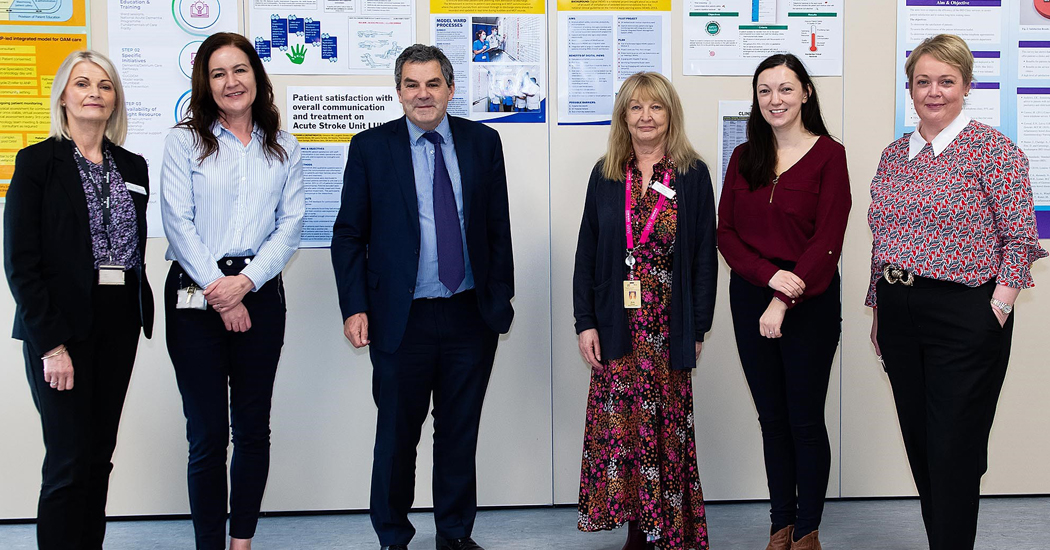Letterkenny University Hospital has joined a research programme to improve the health and wellbeing of nurses in their workplace.
The Magnet4Europe project aims to promote a more positive work environment, based on exemplary nursing practice.
Letterkenny is one of 67 hospitals across Europe participating in the project.
The objective of Magnet4Europe is to evaluate the impact of organisations’ redesign on nurses and clinician’s mental health and wellbeing in acute hospital settings.
In LUH, the model is being embedded in the organisation’s policies, procedures, structures and supports to promote staff wellbeing and empower staff to achieve excellence in patient care.
For example, the hospital hosted a staff information day, which was an opportunity to showcase the wide range of staff supports already available and get feedback regarding what can be further done to support staff wellbeing.
The ‘Structural empowerment’ component of the Magnet model focuses on ensuring nurses are supported to be involved in the decisions which affect their day-to-day work. This is done through having a clinical nursing voice on hospital committees and working groups and through the establishment of professional practice councils for different nursing grades.
The councils are nurse led and will be a voice of change within the LUH Nursing Service. They are forums for staff to convene to discuss nursing care issues and work together to find resolutions.
The staff nurse council was the first to be embedded and is already having a positive impact in the hospital. Speaking about the council, Sean Murphy, Hospital Manager LUH said, “LUH has a great tradition of excellence in nursing and the development of enhanced nursing practice. I am delighted to work with such committed and caring nursing teams right across the hospital.
“The Magnet programme has proven to be an incredibly helpful tool in strengthening engagement with our nursing staff. The nursing practice council is an empowering initiative; it allows staff that are closest to the patient and those who provide bedside care to have a voice in the development of practice. I am looking forward to working in partnership with our nursing staff to develop enhanced models of care in the hospital.”
Other initiatives such as the launch of the LUH Rainbow badges, Africa Day and International Nurse Day celebrations ensure a culture of diversity and inclusion is visible.
Other plans involve optimising communication and being more innovative in how information is shared with staff, finding new ways to acknowledge and celebrate achievements, enhancing leadership capabilities within the nursing workforce and tailoring educational opportunities to the needs of staff.
There is a large body of evidence which suggests that Magnet hospitals achieve higher employee retention rates, lower intention to leave, improved lower nurse burnout, higher levels of job satisfaction, better patient outcomes and improved patient safety. Magnet hospitals also report better clinical outcomes with shorter patient stay and reduced readmission rates.
Cathy Whoriskey, Chairperson of the Staff Nurse Council and Staff Nurse in the Emergency Department said; “Having previously worked in a magnet designated hospital, I am thrilled to be part of this fantastic initiative here in LUH. This long-awaited platform will allow nurses to be involved in reshaping their work environment. Magnet encourages education and career development at all stages, resulting in greater autonomy at the bedside. Not only will this bring increased job satisfaction but, consequently for our patients will led to improved patient care by nurses who are supported to be the very best they can be.”
Marie Callaghan, Magnet Coordinator LUH concluded; “We are aware that nursing staff want more involvement in the decisions that affect their wellbeing, practice environment and clinical practice. The establishment of professional practice councils for nursing provide staff with a voice and a forum to discuss, resolve and escalate the issues that impact them, to support each other and share best practice.
“The staff nurse council has members from across the hospital and their enthusiasm and dedication to patient care is evident. The councils for CNMs and advanced practice nurses will similarly ensure optimisation of communication and offer opportunities for idea sharing and peer support. It is fantastic that the organisation is fully supportive of these changes and recognises the importance of the voice of the frontline staff in LUH.”








